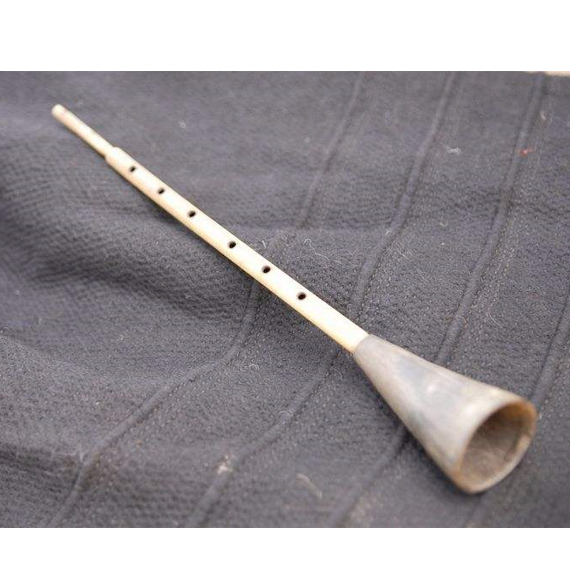Double tube mabu overview
 The double-pipe mabu (pinyin: shuāng guǎn mǎ bù) is a single-reed gas-sounding instrument unique to the Yi people. It is popular in Zhaojue, Ganluo, Yuexi, Meigu and other places in Liangshan Yi Autonomous Prefecture, Sichuan Province.
The double-pipe mabu (pinyin: shuāng guǎn mǎ bù) is a single-reed gas-sounding instrument unique to the Yi people. It is popular in Zhaojue, Ganluo, Yuexi, Meigu and other places in Liangshan Yi Autonomous Prefecture, Sichuan Province.Double-pipe Mabu, in Yi language "horse" means bamboo, and "cloth" means reed pipe, which means a bamboo air-sounding instrument with a reed pipe inserted. Also called Buja. The tube body is made of bamboo, and it is made of two single-tube horse cloths of the same shape and the same pitch tied side by side. Most of them have five or six sound holes, and some two pipes share a horn made of horns as a resonator. It consists of a whistle, a bamboo body and a horn mouth.
The Yi nationality is a nation with a long history and splendid culture. The Yi people are affectionate and affectionate, and can sing and dance well. They sing, dance and play music during festivals, weddings, funerals, torch festivals, Yi year and other traditional national festivals. Words are the voice of the heart, songs are to express the aspirations, whether it is the beauty of home life, the hardships of field work, the wild joy of festivals, the blessings of auspiciousness and peace, the lingering lovesickness, the sad and sad memories, and the longing for a happy love. And the yearning for a happy life, joys and sorrows, joys and sorrows, often resort to music to express, express and relieve.
Mabu is a bamboo tube with a diameter of about 0.6 cm and a length of 18 cm, which has six sound holes, a whistle similar to a clarinet sounding body is inserted at the top, and a small horn horn is installed at the other end. The whistle is also a thinner bamboo tube, about 5 cm long, made of a layer of freely vibrating reeds that open the thin river with one side of its skin close to the bamboo joint. Others combine two identical pipes to form a double-pipe mabu, as if the two mabu are playing at the same time, showing a warmer atmosphere.
Unlike other wind instruments, the mabu can blow overtones, and its range is used above the octave; the teeth and lips bite the reed and the super blow can extend to more than twelve degrees, which just constitutes the range of a vocal singing. Many performers often play folk songs instead of singing, which are deeply loved by the masses.
- Chinese name:Double tube mabu
- alias:Boujah
- popular area:Liangshan Yi Autonomous Prefecture, Sichuan Province
- pinyin:shuāng guǎn mǎ bù
overview of other similar instruments
- sanyanxiao overview
- Daguangxian overview
- Leiqin overview
- hahao overview
- yandundagu overview
- Han Xiaozheng overview
- Fang Xiang overview
- guanzi overview
- zhuqin (Dao Qin) overview
- zhuiqin overview
- bangzi overview
- three-stringed piano overview
- Gehu overview
- xiao overview
- xiaokonghou overview
- Konghou overview
- Sheng overview
- suona overview
- hulusi overview
- gushao overview
 渝公网安备 50010702504639号
渝公网安备 50010702504639号